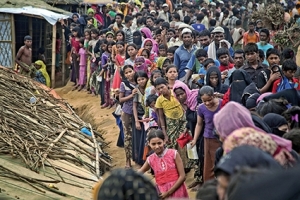Georgia Mentioned in Human Rights Council Interactive Dialogue
The Human Rights Council held an interactive dialogue on July 4 with United Nations High Commissioner for Human Rights Zeid Ra’ad Al Hussein, on the human rights situation of the Rohingya people, with a presentation given by Deputy High Commissioner for Human Rights Kate Gilmore on Burundi and Georgia.
Presenting his update, the High Commissioner said that in recent months, Myanmar forces had engaged in an ethnic cleansing campaign which had caused over 700,000 Rohingyas to flee to Bangladesh since August 2017.
Myanmar claimed that many of the allegations in the address by the High Commissioner were flawed, incorrect and misleading, and that the situation was more complex than explained, involving terrorism, rule of law, illegal migration, and other factors. Myanmar was disturbed that the High Commissioner did not mention these atrocities.
In the interactive dialogue, speakers expressed concern over the deterioration of the situation, and condemned the widespread attacks against the Rohingya community.
Speaking were representatives of the European Union, Pakistan on behalf of Organization of Islamic Cooperation, Maldives, Qatar, Finland, Brazil, Pakistan, Jordan, Libya, Croatia, Kuwait, Belgium, Switzerland, Japan, France, Iraq, Denmark, Australia, Spain, Netherlands, Tunisia, Indonesia, Malaysia, Canada, Azerbaijan, Bangladesh, United Kingdom, Sweden, Turkey, Iceland, Egypt, Saudi Arabia, Lebanon, and Iran, with multiple NGOs also present and taking part in the discussions.
Switzerland urged Myanmar to normalize relations with all human rights mechanisms, as it was horrified by the serious human rights violations and abuses which called for the creation of an Independent Commission of Inquiry, condemning these actions.
Azerbaijan stated that since the signing of the Repatriation Agreement, regretfully, none among the 720,000 Rohingyas in Bangladesh had been able to return as no measures had been taken to address the security and safety of these people. Azerbaijan acknowledged the challenges being faced and stood in solidarity with the people of Bangladesh, who had granted protection to the displaced Rohingya.
Bangladesh stated that it had accepted over 700,000 Rohingyas since last August and its capacity had reached its limit, hence, immediate action is needed.
Multiple statements were also made by NGOs such as Minority Rights Group International and Christian Solidarity Worldwide
Deputy High Commissioner for Human Rights Kate Gilmore presented updates to the council relating to Burundi and Georgia.
Gilmore stated that the human right situation in Burundi continued to deteriorate. Restrictions on civic space and proposed constitutional revisions had generated a host of human rights concerns, with reports of activities by armed groups linked to the ruling party’s youth wing. She also stated that the Government of Burundi was not cooperating by cancelling the visas of experts being deployed to the country.
Regarding Georgia, Gilmore welcomed progress towards passing legislation on establishing a mechanism to investigate alleged violations by law enforcement agencies and on policy steps to combat domestic violence. The Office of the High Commissioner counted on its partnership with authorities and civil society to continue addressing these issues.
Georgia stated that the occupying power, and its regime, had denied the Office of the High Commissioner access to Georgia’s Abkhazia and Tskhinvali/South Ossetia regions, completely disregarding the Council’s resolution on cooperation with Georgia, that the occupied regions were black holes, inaccessible for the international community and without a mechanism to assess the human rights situation. The demolition of the houses of the internally displaced in Tskhinvali under the so-called Russian investment program continued, as well as the deprivation of the local population of medical services, property, education and freedom of movement. The Georgian Government reminded the council of the introduction of a new peace initiative to facilitate trade across the dividing lines, in order to improve the standard of living for the people in Abkhazia and Tskhinvali. However, without objective international monitoring, the situation would only worsen, and so the Georgian Government requested immediate access to the Office of the High Commissioner to be ensured.
Gilmore added that restrictions of freedom of movement remained the most visible and pressing concern in both regions. Access to the territories was important to ensure an objective analysis of the human rights situation on the ground.
The Council met on July 5 to hold general debates on Burundi and Georgia. It will then start taking action on draft resolutions and decisions before it concludes its thirty-eighth regular session on Friday 6 July.
By Shawn Wayne











